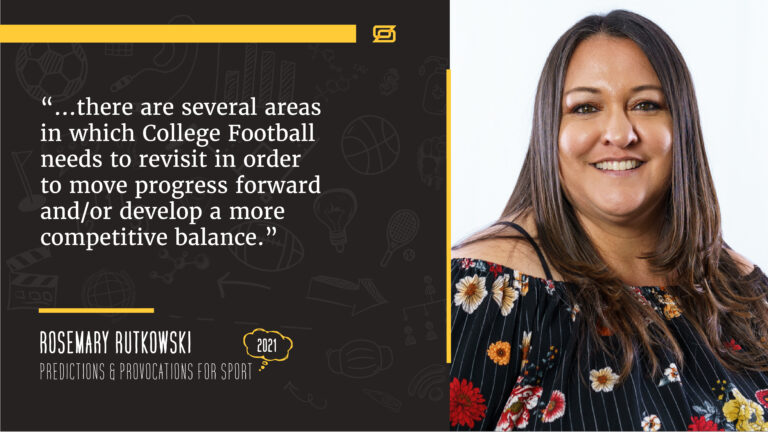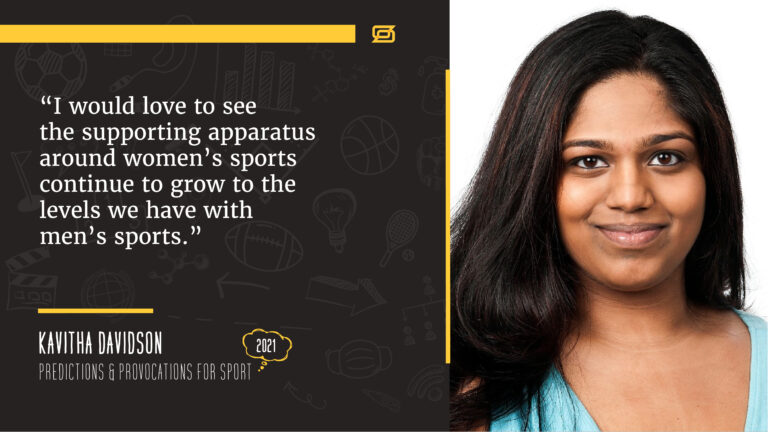More Innovation and Growth Within Women’s Sport
My prediction for 2021 is more a desire. I want to see more innovation and growth within women’s sport. I would wish for better and more sustained media coverage but even I know when to temper my dreams.
The year 2020, which could have gone a whole lot of different ways for women’s sport, had a lot of great highlights. The WNBA and its players announced one of the most progressive Collect Bargaining Agreements for a women’s league ever at the start of 2020. Then we saw the NWSL return first after sports shut down due to the global pandemic, their bubble in Utah a rousing success all-around. The final, which aired on CBS averaged 653,000 viewers, making it the most-watched NWSL match ever. That network TV showing is too often a rarity for this young league (for example, the entire rest of the tournament streamed on CBS All Access). As many men’s leagues saw their ratings tumble during the pandemic and the ever-crowded sports viewing schedule during the summer, the WNBA grew 68%, in large part because there were more games on national television -- 87 -- than ever before. As ever, female athletes around the world continued to push for equity, as evidenced by the United States, Brazil, and England’s women’s national soccer teams. And these are only some of the reasons to be excited about where women’s sports is headed as we enter into 2021.
But I selfishly want more and faster. There was and still is a correct fear (one I shared and continue to carry) that the austerity that would come in the wake of the pandemic would hurt women’s sports more than men’s since plenty of people seem to find plenty of reasons to underfund and under-resourced women’s sports in the best of times. But it’s that very reality -- that women’s sport is often scraping together teams, leagues, and seasons with less -- that makes it more nimble, more able to change with the moment, and less entrenched in the machinery of capitalism than men’s sports.
Also, let’s never forget that so much of sports’ infrastructure was created by and for men. I have advocated for women’s soccer abandoning FIFA all together, given that the corrupt organization has never done anything for the women’s game without pushing, prodding, and demanding from players and supporters.
My hope for 2021 is we see big, bold moves within the women’s game outside of the box or that, at the least, push really hard on that box, even re-shaping it.
2020 has offered a good example of the kind of innovative thinking I’m hoping for. Athletes Unlimited had their inaugural softball season in 2020, soon to be followed by volleyball and lacrosse in 2021. They have TV deals with ESPN and CBS Sports Network.
AU has eliminated team owners and instead, it’s the athletes who “are now decision-makers and stakeholders in the leagues,” according to AU’s website. Here is how ESPN described how the softball season worked: “With total immediate compensation of more than $1 million for its 56 players and a profit-sharing mechanism that allows players a share of any profits up to 20 years beyond their playing career, as well as contributions to charities designated by players, Athletes Unlimited represents a new approach off the field. With a scoring system built around players and designed to crown an individual champion, it also promises a new approach on the field.” Team rosters were shuffled each week, creating new combinations of players. Individual players tallied their own points. “The four highest scorers in a given week become the captains for the following week,” ESPN explained. “Those four captains, de facto general managers, then draft new teams.” AU got rid of coaches replacing them with “facilitators” and relying heavily on the captains instead. It’s a brand new, highly creative way to put money and power into the pockets and hands of the athletes themselves, and gives fans a new way to experience sport.
More of this in 2021, please.
I want more and bigger and different for women’s sport in the coming year. This is a lifelong desire but it feels more pressing and possible than ever before. Let’s go.
Jessica Luther is a freelance journalist whose work has appeared in Sports Illustrated, ESPN The Magazine, the New York Times Magazine, Texas Monthly, Huffington Post, BuzzFeed, and Vice Sports, among others. She is the author of Unsportsmanlike Conduct: College Football and the Politics of Rape and has written extensively on the intersection of sports and violence off the field.
Jessica Luther and Kavitha Davidson new book, Loving Sports When They Don't Love You Back is out now.
Monthly Issue
Predictions & Provocations for Sport: 2021
Although no one could have predicted all that 2020 has been, what lessons will the world of sport take into next year?
We asked some of the best and brightest minds to contribute their thoughts.






